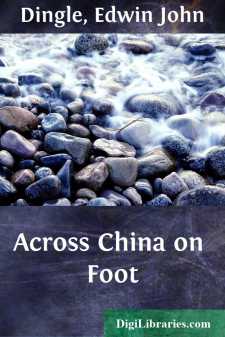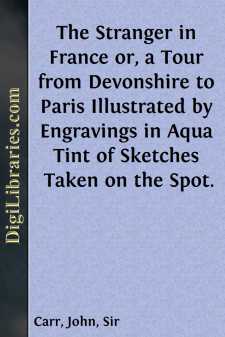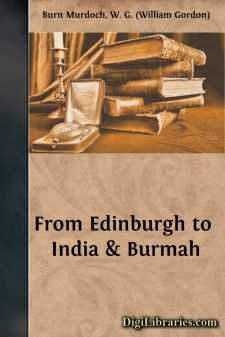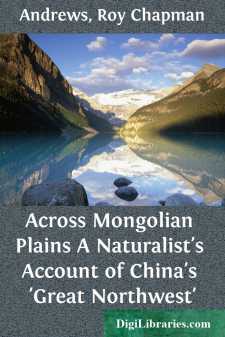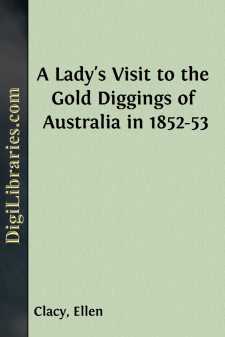Travel
- Africa 29
- Alaska 3
- Asia 46
- Australia & Oceania 26
- Canada 31
- Caribbean & West Indies 5
- Central America 1
- Europe 151
- General 39
- Maps & Road Atlases 1
- Mexico 10
- Middle East 18
- Polar Regions 7
- Reference 11
- Restaurants 1
- Russia 6
- South America 16
- United States 71
Travel Books
Sort by:
INTRODUCTORY The scheme. Why I am walking across Interior China. Leaving Singapore. Ignorance of life and travel in China. The "China for the Chinese" cry. The New China and the determination of the Government. The voice of the people. The province of Yün-nan and the forward movement. A prophecy. Impressions of Saigon. Comparison of French and English methods. At Hong-Kong. Cold sail up the...
more...
by:
John Carr
CHAPTER I. Torr Abbey.—Cap of Liberty.—Anecdote of English Prejudice.—Fire Ships.—Southampton River.—Netley Abbey. It was a circumstance, which will be memorable with me, as long as I live, and pleasant to my feelings, as often as I recur to it, that part of my intended excursion to the Continent was performed in the last ship of war, which, after the formal confirmations of the peace,...
more...
CHAPTER I Some time ago I wrote a book about a voyage in a whaler to the far south, to a white, silent land where the sun shines all day and night and it is quiet as the grave and beautiful as heaven—when it is not blowing and black as—the other place! A number of people said they liked it, and asked me to write again; therefore these notes and sketches on a Journey to India and Burmah. They may...
more...
I. LIFE IN A PHILIPPINE VILLAGE. The little village or barrio of Mariveles is situated just inside the narrow cape that forms the northern border of the entrance to Manila Bay. The city of Manila lies out of sight, thirty miles to the southeast, but the island of Corregidor lies only seven miles to the south, and the great searchlights at night are quite dazzling when turned directly upon the village....
more...
by:
Susanna Moodie
INTRODUCTION "Dear foster-mother, on whose ample breast The hungry still find food, the weary rest; The child of want that treads thy happy shore, Shall feel the grasp of poverty no more; His honest toil meet recompense can claim, And Freedom bless him with a freeman's name!" S.M. In our work of "Roughing it in the Bush," I endeavoured to draw a picture of Canadian life, as I found...
more...
THE RIDGE TRAIL Six trails lead to the main ridge. They are all good trails, so that even the casual tourist in the little Spanish-American town on the seacoast need have nothing to fear from the ascent. In some spots they contract to an arm's length of space, outside of which limit they drop sheer away; elsewhere they stand up on end, zigzag in lacets each more hair-raising than the last, or fill...
more...
OKEBOURNE CHACE. FELLING TREES. The great house at Okebourne Chace stands in the midst of the park, and from the southern windows no dwellings are visible. Near at hand the trees appear isolated, but further away insensibly gather together, and above them rises the distant Down crowned with four tumuli. Among several private paths which traverse the park there is one that, passing through a belt...
more...
CHAPTER IOUR FIRST PEEP AT FINLAND It is worth the journey to Finland to enjoy a bath; then and not till then does one know what it is to be really clean. Finland is famous for its baths and its beauties; its sky effects and its waterways; its quaint customs and its poetry; its people and their pluck. Finland will repay a visit. Foreign travel fills the mind even if it empties the pocket. Amusement is...
more...
PREFACE During 1916-1917 the First Asiatic Expedition of the American Museum of Natural History carried on zoölogical explorations along the frontiers of Tibet and Burma in the little known province of Yün-nan, China. The narrative of that expedition has already been given to the public in the first book of this series "Camps and Trails in China." It was always the intention of the American...
more...
by:
Ellen Clacy
Chapter I. It may be deemed presumptuous that one of my age and sex should venture to give to the public an account of personal adventures in a land which has so often been descanted upon by other and abler pens; but when I reflect on the many mothers, wives, and sisters in England, whose hearts are ever longing for information respecting the dangers and privations to which their relatives at the...
more...


